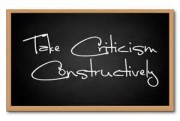 Do you like to be criticized? Most of us don’t!
Do you like to be criticized? Most of us don’t!
It hurts!
It makes us angry!
We want to “hit” back!
How good are you at handling criticism?
The only way to live without being criticized is to hide away in a cave and never see anyone.
If you are around people, you are going to receive some criticism.
So, wouldn’t we all benefit from learning a productive way to handle it?
Turning Criticism into Productive Outcomes
5 Steps to Turn Criticism to your Advantage
1. Change Your Perspective
Instead of thinking of criticism as something DESTRUCTIVE, think of it as a LEARNING AND GROWING experience.
Instead of thinking of the person as a “BAD GUY” think of them as a “HELPFUL PERSON.”
Instead of thinking of them as giving you something “BAD” think of it as a “GIFT.”
Instead of thinking “HOW DARE THEY” think “I’M THANKFUL” for what I can learn from this.
Instead of thinking, “WHAT A JERK” think “HOW CAN I USE THIS” to become a better person.
2. Don’t get upset or defensive.
Recognize and acknowledge your immediate emotional reaction.
TAKE SEVERAL DEEP BREATHS.
Breathe in “peace” and breathe out “anger.”
Breathe in your new ways of thinking.
- This could be helpful to me if I allowed it to be.
- What can I learn from this if I allowed myself to?
- How can I use this to help me become a better person?
Use your breath and your new ways of thinking to gain control over your emotional response.
3. Listen and be open-minded
Keep your full attention on their words so you can really hear what they are saying.
Use your SELF-TALK.
- “I am going to listen to their opinion and learn what I can.”
- “This doesn’t take away from my worth as a person.”
When you start to feel emotional, remind yourself to listen with the intent of gaining helpful knowledge.
LISTEN without jumping to conclusions and judgmental thoughts.
The other person may have some merit.
4. Repeat, Paraphrase and ask ?’s
Ask questions to make sure you understand correctly.
Repeat what they said and ask,
“Is this what you are saying?”
We often make INCORRECT ASSUMPTIONS about the meaning of what someone said. Make sure to check it out before assuming!
5. Agree with part of it.
Most people tend to focus on the part that’s NOT TRUE versus seeing any TRUTH.
If you can find and verbally acknowledge some truth in what they say, it will disarm them and decrease your defensiveness.
- “Yes, it’s true, I did forget to file that form, relay that message, etc.
- “Yes, you are right, I do need to work on that.”
How do Successful People Handle Criticism?
Successful people listen to the criticism, glean what they can from it and move on without getting emotionally stuck on it.
Successful people are open-minded and learn a positive way to turn criticism into something that benefits them.
PRACTICE, PRACTICE, PRACTICE
Each time you practice these skills, you will increase your ability to learn and grow from criticism versus getting emotionally defensive.
Eventually you can become a pro at staying calm and collective during criticism, even when it’s directed at you!



